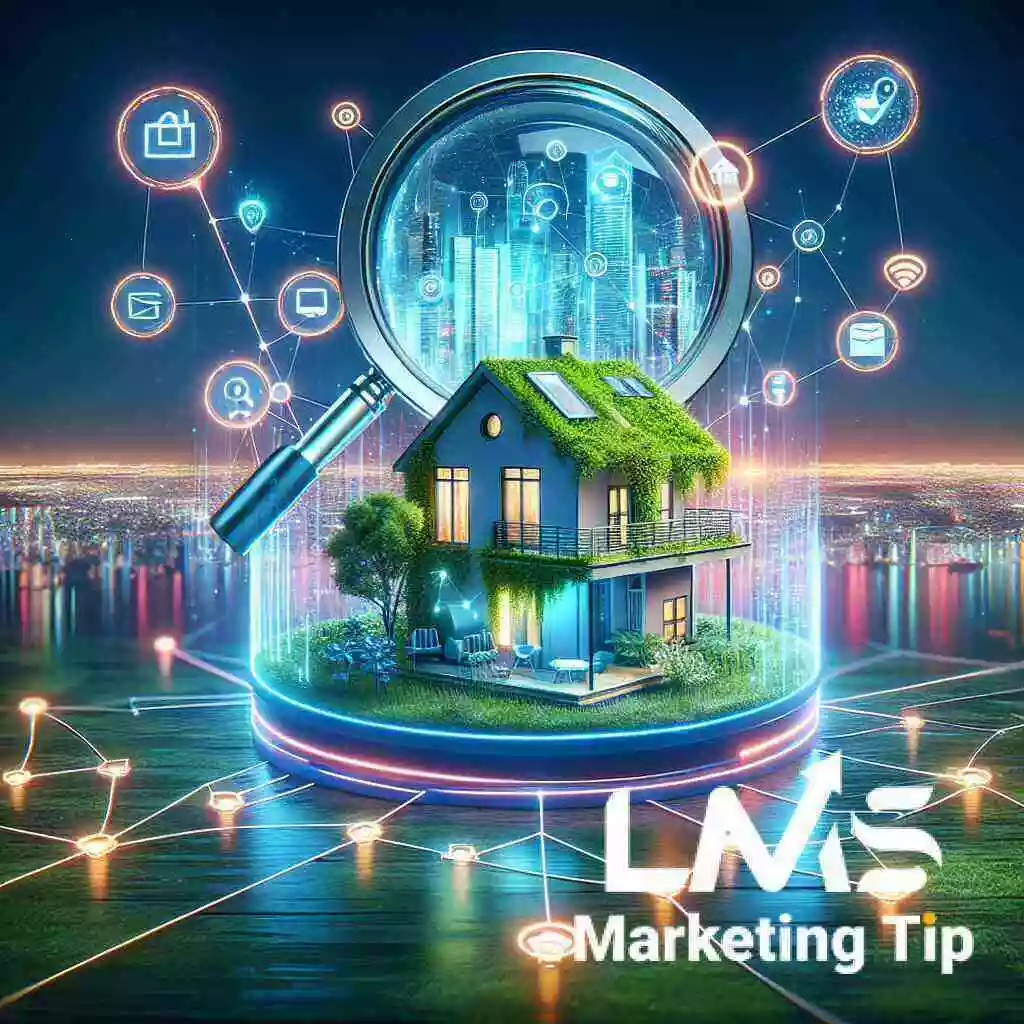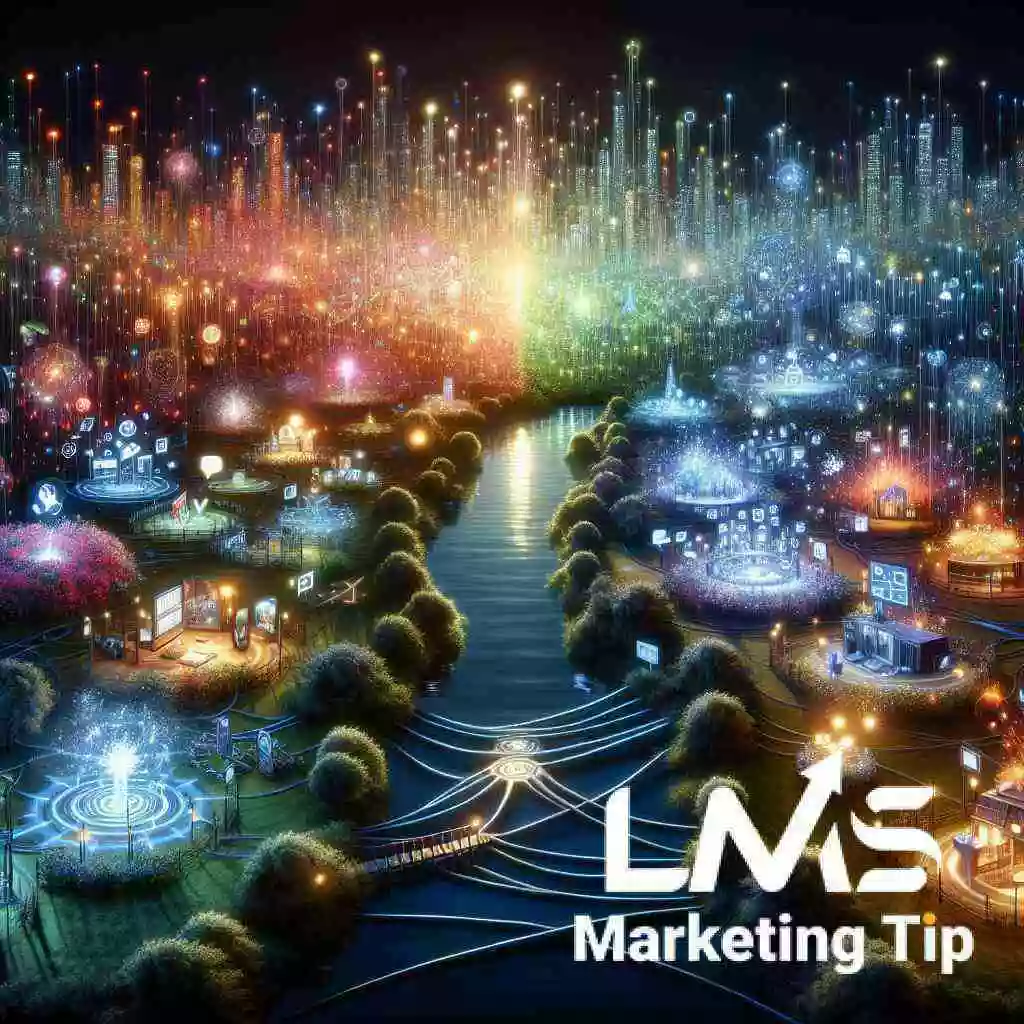
The Foundation of Real Estate Digital Marketing
Understanding 2024 Real Estate Trends
Real estate, a dynamic and ever-evolving industry, is set to experience significant shifts in 2024. Staying ahead in this competitive sphere requires an understanding of emerging trends, including the rapid digitalization of property listings and the growing importance of virtual tours. Technology continues to shape buyer behaviors, making online presence and digital marketing strategies more crucial than ever. The rise of sustainable living and smart homes is also influencing buyer preferences, indicating a need for marketers to highlight these features in their campaigns. Keeping abreast of these trends is essential for real estate professionals aiming to capture the attention of a market that increasingly relies on digital platforms for property searches and transactions.
Building a Solid Real Estate Marketing Plan
To capitalize on 2024 real estate trends, crafting a comprehensive and flexible marketing plan is imperative. Begin by setting clear, measurable objectives that align with your overall business goals. Incorporate a variety of marketing channels into your plan, including digital advertising, email marketing, social media, and content marketing, to ensure a broad and effective reach. Emphasizing the web design trends in New York for 2024, for instance, can help your website stand out in a crowded market. Additionally, integrating advanced analytics and tracking tools will enable you to monitor your campaign’s performance in real time, allowing for timely adjustments to maximize effectiveness. A well-rounded plan should not only attract potential clients but also engage and retain them through personalized, relevant content.
Identifying Your Target Audience for Real Estate
Understanding your target audience is the cornerstone of any successful real estate marketing strategy. Start by analyzing demographic data, including age, income, and purchasing power, to create detailed buyer personas. Consider the unique needs and preferences of each segment, whether first-time homebuyers, luxury property seekers, or commercial clients. Geographic location plays a significant role in real estate marketing, so tailor your strategies to appeal to both local buyers and out-of-state investors looking for opportunities in your area. Engaging with your target audience through surveys and social media can provide valuable insights, helping you refine your marketing messages and channels. By clearly identifying and understanding your target audience, you can develop more focused and effective marketing strategies that resonate with potential clients and drive conversions.
Optimizing Your Real Estate Web Presence
Real Estate Web Design Essentials
In the rapidly evolving digital landscape of 2024, the real estate web design essentials are pivotal for establishing a robust online presence. A well-designed website acts as the cornerstone of your digital marketing efforts, serving not only as a platform for showcasing property listings but also as a reflection of your brand’s identity and values. To captivate potential clients, a real estate website must be visually appealing, intuitive, and mobile-responsive, ensuring a seamless user experience across all devices. Incorporating high-quality images, virtual tours, and interactive property maps can significantly enhance engagement and help users connect with the listings on a deeper level. Furthermore, implementing user experience design principles will ensure your website is accessible, user-friendly, and tailored to meet the specific needs of your target audience, thereby maximizing conversion rates and bolstering your online visibility.
Real Estate Website Optimization for Maximum Engagement
Maximizing engagement on your real estate website necessitates a strategic blend of content, design, and technology. Ensuring quick load times, streamlined navigation, and effective call-to-action (CTA) buttons are fundamental to keeping potential clients engaged and driving them toward making inquiries or scheduling viewings. Real estate websites should prioritize content that adds value to the user’s search, such as detailed property descriptions, neighborhood insights, and valuable resources for buyers and sellers. Incorporating social proof, including client testimonials and success stories, can further enhance credibility and trustworthiness. To achieve maximum engagement, it’s crucial to regularly update your website with fresh content, market updates, and new listings, encouraging visitors to return and interact with your website repeatedly. By focusing on user engagement and satisfaction, your real estate website can serve as a powerful tool for generating leads and building lasting relationships with clients.
Leveraging SEO Strategies for Real Estate Websites
Leveraging SEO strategies for real estate websites is crucial for increasing visibility and attracting organic traffic in 2024’s competitive digital marketplace. Optimizing your website for search engines involves a comprehensive approach, targeting on-page, off-page, and technical SEO elements. Keyword research plays a vital role in this process, enabling you to identify and incorporate the terms and phrases your target audience uses when searching for real estate services online. Creating high-quality, SEO-friendly content based on these keywords can significantly improve your website’s rankings on search engine results pages (SERPs), making it easier for potential clients to discover your services. Additionally, optimizing meta tags, headlines, and images, while ensuring your website’s architecture is search-engine friendly, can further boost your SEO efforts. Building high-quality backlinks from reputable sites within the real estate industry can also enhance your site’s authority and search rankings. With a robust SEO strategy tailored to the real estate market, you can increase your website’s organic reach, drive more traffic, and ultimately, generate more leads and conversions in 2024.
Leveraging Social Media for Real Estate Success
The power of social media in shaping public perceptions and driving business outcomes cannot be overstated, especially in the realm of real estate. As we move towards 2024, leveraging social media for real estate success becomes not just an option but a necessity for realtors aiming to capture the attention of their target audience and carve a niche for themselves in the highly competitive real estate market.
Choosing the Right Social Media Platforms for Realtors
Not all social media platforms are created equal, especially when it comes to real estate marketing. Identifying and focusing on platforms that offer the greatest potential for connecting with your target audience is crucial. Facebook continues to be a powerhouse for real estate professionals, thanks to its extensive user base and sophisticated advertising capabilities. Instagram, with its visually-centric approach, is ideal for showcasing properties and lifestyle content that appeals to homebuyers. LinkedIn serves as a professional network where Realtors can connect with industry peers and potential clients, particularly in the commercial real estate sector.
For realtors, choosing the right platforms means considering where their target audience for real estate spends most of their time and how they prefer to consume content. It’s also about understanding the unique features and advertising tools each platform offers and how they can be leveraged to maximize reach and engagement. By leveraging social media for real estate success, Realtors can not only increase visibility but also build relationships and trust with potential buyers and sellers.
Effective Real Estate Social Media Marketing Strategies
Developing effective social media marketing strategies requires a keen understanding of both the platforms and the real estate market. One strategy involves creating and sharing content that educates and informs your audience about the real estate process, market trends, and property insights. This positions you as a knowledgeable and trustworthy source, encouraging engagement and shares. Another strategy is to leverage user-generated content, such as testimonials and story sharing, which can significantly enhance credibility and humanize your brand.
Interactive content like polls, quizzes, and Q&A sessions can foster engagement and provide valuable insights into your audience’s preferences and pain points. Paid advertising campaigns, utilizing the extensive targeting capabilities of platforms like Facebook and Instagram, can help in pinpointing and reaching potential clients with precision. Combining organic engagement tactics with strategic paid efforts can amplify your real estate marketing strategies and outcomes.
Engaging Your Audience with High-Quality Content
At the heart of social media success is the ability to engage your audience with high-quality content that resonates with them. Video tours of properties, client testimonials, and live Q&A sessions can provide an immersive experience that static images or text posts cannot. Creating content that is not only visually appealing but also informative and relatable can significantly increase user engagement and shareability.
Consistently posting content that speaks to the needs and interests of your audience fosters a sense of community and belonging among your followers. Utilizing digital business cards for real estate professionals within your social media profiles can facilitate seamless communication and lead capture, further enhancing your marketing efforts. By focusing on quality, relevance, and engagement, Realtors can effectively leverage social media to build a robust online presence and drive real estate success in 2024.
Harnessing the power of social media requires ongoing effort, adaptability, and a commitment to engaging with your audience in meaningful ways. As real estate marketing continues to evolve, staying ahead of the curve in terms of trends, platform updates, and consumer behaviors will be key to leveraging social media for maximum impact and success.
Enhancing Visibility with Real Estate Advertising Campaigns
Designing Captivating Real Estate Advertising Campaigns
The competitive landscape of the real estate market in 2024 demands that advertising campaigns not only catch the eye but also captivate the heart and imagination of potential clients. Crafting real estate advertising campaigns that stand out begins with a deep understanding of your target audience and what drives their decisions in property investment. Utilizing storytelling within your ads can create a personal connection with viewers, turning a simple property listing into a potential home or lucrative investment in their minds. High-quality visuals, coupled with engaging narratives that highlight unique property features or the lifestyle that comes with them, can significantly enhance the appeal of your listings. Moreover, incorporating emerging technologies such as virtual reality tours into your ads can provide an immersive experience that traditional static images cannot achieve. By focusing on creative content that resonates with your audience, you set the groundwork for advertising campaigns that not only draw attention but also drive action.
Utilizing Search Engine Marketing for Real Estate
Search engine marketing (SEM) has evolved into a critical tool for real estate professionals looking to enhance their visibility online. With the right SEM strategies, realtors can significantly increase their chances of appearing at the top of search engine results pages (SERPs), capturing the attention of potential buyers right at the moment they’re searching for properties or real estate services. Key components of an effective SEM strategy include keyword research to identify the terms and phrases potential clients are using, creating compelling ad copy that resonates with your target audience, and optimizing landing pages to ensure high conversion rates. Leveraging search engine optimization for real estate, alongside paid search advertising, can provide a comprehensive approach to search marketing, driving both organic and paid traffic to your website. By regularly analyzing and refining your SEM campaigns based on performance data, you can continuously improve your visibility and attract a steady stream of leads.
The Power of Video Marketing for Real Estate
In 2024, video marketing stands as a titan in the realm of real estate promotion, offering a dynamic and engaging way to showcase properties and tell your brand’s story. The power of video marketing lies in its ability to convey vast amounts of information in an easy-to-digest and highly engaging format. From virtual tours that allow potential buyers to explore properties at their leisure to client testimonials that build trust and credibility, video content can significantly impact viewers’ decision-making processes. Social media platforms provide the perfect venue for sharing real estate videos, taking advantage of their extensive reach and the tendency of users to share content they find useful or inspiring. By incorporating video marketing into your real estate advertising strategy, you not only enhance the visibility of your listings but also provide a richer, more informative experience for potential clients, setting the stage for stronger engagement and higher conversion rates.
Generating Leads Through Strategic Real Estate Marketing
Real estate professionals aiming for success in 2024 must master the art of generating and nurturing leads. This section delves into the strategic approaches to real estate lead generation, harnessing the power of email marketing, and specifically targeting high-net-worth individuals for luxury real estate opportunities. By deploying a multifaceted marketing strategy that includes these elements, agents, and brokers can significantly increase their potential for sales and long-term client relationships.
Real Estate Lead Generation Tactics
Generating leads is the lifeblood of any real estate business, dictating the pace at which a real estate professional’s client base grows. Successful real estate lead generation tactics involve a combination of digital and traditional marketing strategies designed to capture the attention of potential buyers and sellers.
One effective approach is to leverage search engine optimization (SEO) to increase the visibility of your real estate website, making it easier for potential clients to find you when they search for real estate opportunities online. Additionally, social media platforms offer powerful tools for realtors to connect with their target audience, engage with them on a personal level, and showcase their listings visually and interactively.
Content marketing is another cornerstone of lead generation, providing valuable information, market insights, and property highlights to keep your audience engaged and establish your authority in the real estate field. Offering free resources, such as buying guides, selling tips, or market analysis reports, can be an excellent way to capture leads by requiring users to submit their contact information in exchange for valuable content.
Furthermore, hosting virtual and in-person events can attract potential clients and provide opportunities for direct engagement. These events can range from webinars discussing market trends to open houses showcasing new listings.
Email Marketing Strategies for Real Estate
In the realm of real estate digital marketing, email marketing stands out for its direct approach and remarkable efficiency in nurturing leads into clients. Creating personalized and informative email campaigns can keep your audience engaged while gently guiding them through the buying or selling process.
Segmenting your email list allows for tailored communication strategies that cater to the specific interests and needs of different groups within your audience. For instance, potential buyers could receive listings similar to their search preferences, while sellers could get updates on market conditions affecting the sale prospects of their properties.
Automated email sequences triggered by specific actions, such as downloading a guide from your website or attending an open house, ensure timely follow-up and keep your leads engaged without manual effort on your part. Incorporating visually appealing elements, such as high-quality images of new listings, and interactive features, like virtual tour links, can significantly enhance the effectiveness of your email campaigns.
Additionally, providing exclusive market insights and updates through your emails establishes value, encouraging recipients to stay subscribed and pay closer attention to your communications.
Luxury Real Estate Marketing to High-Net-Worth Individuals
Marketing luxury real estate requires a refined strategy that resonates with the unique desires and demands of high-net-worth individuals. This elite group of buyers looks for exceptional properties that offer unparalleled quality, exclusivity, and privacy. To effectively reach and engage these prospects, luxury real estate marketing to high-net-worth individuals should focus on showcasing the superior features and lifestyle opportunities associated with high-end properties.
Developing high-quality, bespoke marketing materials that reflect the luxury and prestige of your listings is essential. This includes professional photography, drone videography, and custom-designed brochures or presentations that highlight the unique selling points of each property.
Networking events, exclusive viewings, and private showings can offer personalized experiences that appeal to the tastes and preferences of affluent buyers. Leveraging partnerships with luxury brands and high-profile influencers can also enhance the visibility and desirability of your listings among this target demographic.
Finally, a strong digital presence on platforms frequented by high-net-worth individuals, such as premium real estate websites and social media platforms catering to luxury lifestyles, is crucial for capturing their interest and initiating contact.
By implementing these targeted strategies within your real estate marketing plan, you can optimize your lead generation efforts, attract more qualified buyers, and elevate your brand in the competitive real estate market of 2024.
Measuring Success and Optimizing Your Approach
Tracking and Analyzing Your Real Estate Marketing Results
To ensure the effectiveness of your real estate marketing efforts in 2024, it is crucial to track and analyze your marketing results. Utilizing cutting-edge analytics tools can provide in-depth insights into the performance of your marketing strategies, from web traffic and social media engagement to email open rates and conversion rates. By setting up key performance indicators (KPIs) that align with your business objectives, such as lead generation numbers, website visits, and social media follower growth, you can get a clearer picture of what strategies are working and which ones require tweaking.
Real estate marketers should pay close attention to metrics such as click-through rates (CTR) on digital advertising campaigns, the number of quality leads generated, and the engagement levels on property listings. Regularly monitoring these metrics allows for timely adjustments to marketing tactics, ensuring optimal performance and efficient allocation of resources.
Furthermore, conducting A/B testing on different elements of your marketing campaigns, from email subject lines to social media ads, can help identify the most effective approaches, enabling you to refine your strategies for better results over time.
Adjusting Your Digital Marketing Plan for Maximum ROI
Successfully adjusting your digital marketing plan requires a proactive approach to incorporating data-driven insights gained from tracking and analyzing your marketing results. Review your performance regularly to identify trends, patterns, or sudden changes in consumer behavior that could impact your marketing effectiveness. Use these insights to adapt your strategies, whether it involves shifting focus to more successful platforms, altering your content approach, or revising your SEO tactics based on the latest real estate SEO trends in New York in 2024.
Optimizing for maximum ROI often involves reallocating your budget to invest more in high-performing channels and scaling back on those with lackluster performance. Additionally, refining your target audience profiles based on conversion data can enhance the precision of your marketing campaigns, ensuring your content reaches those most likely to convert into clients.
Embrace flexibility in your digital marketing plan, allowing for quick pivots and innovations in response to new market opportunities or challenges. This agile approach can significantly enhance your marketing’s ROI, ensuring your real estate business remains competitive and responsive to market dynamics in 2024.
The Role of a Real Estate Marketing Agency in Your Growth
Collaborating with a specialized real estate marketing agency can turbocharge your business growth by bringing in advanced expertise, innovative strategies, and comprehensive services tailored to the real estate industry. A dedicated agency understands the unique challenges and opportunities within the real estate market, offering insights that can refine your marketing approach for enhanced performance.
One primary advantage of partnering with a real estate marketing agency is access to a breadth of skills and technologies, from SEO and social media marketing to web design and video production. This broad expertise enables the development of integrated marketing strategies that harmonize across multiple channels for a seamless customer experience.
Agencies can also offer scalable solutions that grow with your business, providing the flexibility to adjust service levels based on your current needs and future goals. Their experience in tracking and analyzing marketing results ensures that data-driven decisions fuel your campaigns, optimizing your marketing investment for better returns.
Furthermore, marketing agencies often foster industry connections and partnerships that can benefit your real estate business, from access to premium advertising platforms to collaborations with influential media outlets. By leveraging these relationships, a real estate marketing agency plays a pivotal role in elevating your brand’s presence and achieving sustained business growth.
By focusing on these advanced strategies and leveraging the expertise of a marketing agency, real estate professionals can significantly enhance their marketing efforts, ensuring a strong, profitable presence in the competitive 2024 landscape.
Conclusion: Mastering the Art of Real Estate Marketing in 2024
Summing Up Effective Real Estate Marketing Strategies for 2024
To thrive in the real estate market of 2024, professionals must adopt and refine a multichannel marketing approach, leveraging the full spectrum of digital marketing tools and platforms at their disposal. From creating effective real estate marketing in New York in 2024 that resonates with local buyer and seller preferences to deploying powerful SEO strategies that enhance online visibility, success hinges on a marketer’s ability to adapt to the evolving digital landscape. Emphasis should also be placed on utilizing data analytics to guide decision-making, ensuring that every marketing move is informed by real-time insights and trends.
Integrating advanced technologies, such as VR for virtual tours, alongside traditional marketing tactics, allows for a comprehensive approach that caters to the diverse needs and preferences of the target audience. Establishing a strong real estate web presence is fundamental, acting as the hub for all marketing efforts and a pivotal touchpoint for customer engagement. Superior web design, optimized for user experience, ensures that potential clients find value and ease in navigating real estate listings and resources online.
Staying Ahead of the Curve in Real Estate Digital Marketing
In the fast-paced world of real estate, staying ahead of the curve involves not just keeping up with current trends but anticipating future shifts in the market and consumer behavior. Innovations in digital marketing for realtors, such as the exploitation of emerging social media platforms and the sophisticated use of AI and machine learning for personalized marketing campaigns, are set to define the competitive edge in 2024. As sustainability and smart home technologies become increasingly important to buyers, marketing strategies should highlight these features to align with consumer values and priorities.
Building meaningful relationships through social media and content marketing, grounded in authenticity and valuable information, fosters trust and loyalty among clients. These strategies not only boost brand visibility but also encourage engagement and referrals, which are invaluable in the real estate sector. An ongoing commitment to learning and development, particularly in digital skills and market knowledge, empowers marketers to innovate and excel in their campaigns.
Next Plans: Implementing Your Real Estate Marketing Strategies
The dynamic landscape of 2024’s real estate market demands a proactive and strategic approach to marketing. Implementation begins with a solid plan that outlines goals, target audiences, channels, and tactics, grounded in a deep understanding of market trends and consumer needs. A focus on quality, relevance, and consistency across all marketing materials ensures a cohesive and engaging brand message. Real estate professionals should leverage real estate marketing services on Long Island or similar specialized agencies that offer comprehensive solutions tailored to the nuances of the real estate market. This partnership can bring a level of expertise and innovation that significantly amplifies marketing efforts.
Regular review and optimization of strategies based on performance analytics allow for agile adjustments that keep campaigns effective and efficient. Investing in professional development and technology tools can enhance the skills and capabilities of the marketing team, ensuring that they remain at the forefront of digital marketing excellence.
As we look ahead to 2024, the path to success in real estate marketing lies in embracing digital transformation, engaging with clients through compelling content and experiences, and continuously refining strategies to achieve measurable results. By implementing these advanced strategies, real estate marketers can not only achieve their business objectives but also set new standards of success and innovation in the industry.
Frequently Asked Questions
Question: How can Marketing Tip’s strategies on real estate digital marketing adapt to the evolving 2024 real estate trends?
Answer: Marketing Tip stays at the forefront of evolving market dynamics by continuously researching and analyzing upcoming real estate trends. Our digital marketing strategies for realtors are designed to be agile and robust, tailor-made to leverage technological advancements like virtual tours and AI-driven analytics. We focus on crafting effective real estate marketing plans that not just track but predict changes in consumer behavior, ensuring our clients remain competitive and relevant. By incorporating real estate SEO strategies, social media platform optimization, and exquisite real estate web design, we make sure your real estate business not only adapts but thrives amidst the ever-evolving 2024 market landscape.
Question: What makes Marketing Tip a reliable partner for developing an effective real estate marketing plan in 2024?
Answer: Marketing Tip, with its extensive expertise in digital marketing across multiple industries, brings a wealth of knowledge to real estate marketing. Our team of seasoned professionals utilizes a combination of advanced analytics, creative content marketing, and strategic social media engagement to design bespoke real estate marketing plans. What sets us apart is our commitment to personalized service and measurable results, ensuring every marketing strategy is aligned with our client’s business goals. Leveraging real estate SEO strategies, innovative web design, and effective real estate social media marketing, we ensure your brand stands out in the competitive 2024 market. Trust Marketing Tip to be your guide in unlocking the full potential of digital marketing for realtors.
Question: How does Marketing Tip ensure that its luxury real estate marketing strategies effectively target and engage high-net-worth individuals?
Answer: Marketing Tip understands the unique buying behaviors and preferences of high-net-worth individuals, crafting luxury real estate marketing strategies that resonate with this discerning audience. We focus on creating sophisticated, high-quality marketing materials and employing targeted advertising campaigns that highlight the exclusivity and luxury of high-end properties. Through strategic use of high-resolution imagery, video marketing for real estate, and exclusive digital showcase platforms, we ensure maximum visibility among the affluent demographic. Our luxury real estate marketing plans are designed to convey the unparalleled lifestyle and investment opportunities your properties offer, engaging potential buyers on a level that transcends conventional marketing efforts.
Question: In the context of ‘How to Nail Real Estate Marketing in 2024,’ how important are real estate website optimization and content marketing, according to Marketing Tip?
Answer: In the guide ‘How to Nail Real Estate Marketing in 2024,’ real estate website optimization and content marketing are highlighted as critical components. Marketing Tip emphasizes the importance of creating a user-friendly, aesthetically pleasing, and mobile-responsive website design as the cornerstone of your digital presence. A well-optimized website, combined with a comprehensive real estate content marketing strategy, engages potential clients by offering valuable insights, market analysis, and unique property showcases. These elements work synergistically to enhance your online visibility, position your brand as a thought leader in the real estate industry, and drive targeted traffic to your listings. Engaging, SEO-driven content boosts search engine rankings, ensuring your properties are found by the right audience at the right time.
Question: Can Marketing Tip assist in leveraging social media platforms for realtors to enhance brand visibility and lead generation?
Answer: Absolutely, leveraging social media platforms for realtors is one of Marketing Tip’s core strengths. We understand that each platform has its unique advantages, from Facebook’s extensive user base and targeted advertising capabilities to Instagram’s visually-driven content, which can showcase properties effectively. Our tailored social media marketing strategies focus on engaging content creation, audience interaction, and data-driven advertising campaigns to maximize your brand’s visibility. By identifying the best platforms for your target audience and crafting compelling, relatable content, Marketing Tip can significantly enhance your online presence, foster meaningful connections with potential clients, and boost lead-generation efforts for your real estate business in the competitive digital arena.











